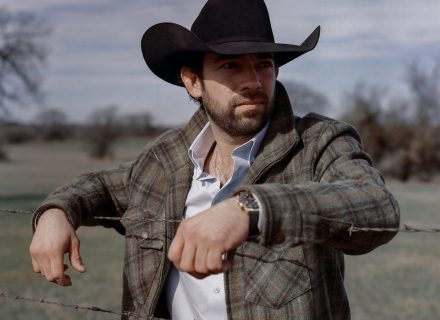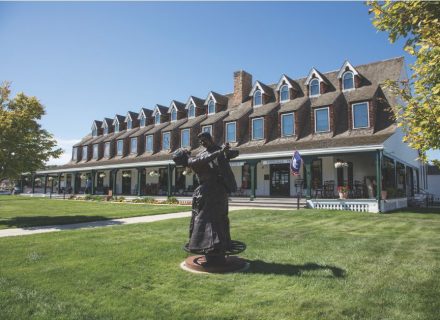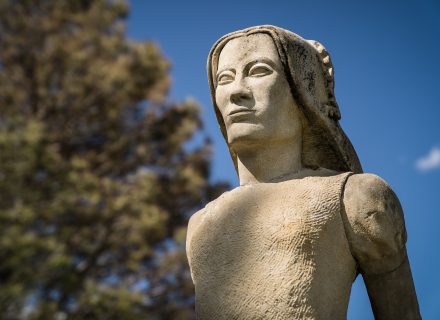In Idaho, a growing number of women are training working dogs for ranches worldwide.
Under a baby-blue cloudless sky in central Idaho, a black and white dog crouches low behind the flock of sheep, its eyes fixed unwaveringly on the half-dozen nervous little ewes. Although the animals trot in a tight-knit clique within a pen, the sleek Border Collie is stiff with attention as Robin Brown blows a series of different sounds through the custom-made tin whistle around her neck.
She blows a short, loud noise, and the dog darts to move the sheep in one wide arc. Another whistle and the flock suddenly heads in the opposite direction. Brown blows again, and the dog drops low on its belly to stare intently at its bleating wards.
“This whistle is essential to what I do,” Brown says. “The dogs can hear that whistle a mile away, so I don’t have to yell or scream, I can just whistle. It’s a whole language.”
Besides herding cattle and sheep from one pasture to the next and keeping them out of the creek bottoms, the dogs also play a valuable role in keeping the animals safe.
In Idaho’s Indian Valley, where Brown and her husband, Rocky, operate the Broken Circle Ranch, raising and training Border Collies for real working ranches across America is serious business. According to Brown, the value of a well-trained stock dog is equal to three men on horseback, although her husband insists a good dog is equal to the value of six men on horseback.
It’s a lucrative business, too. A well-trained herding or ranch dog can sell for up to $25,000 to $30,000 each (though usually in the $5,000 to $7,000 range). But their value to ranchers and livestock owners is untold.
And business is still booming — and evolving. The newest breed of dog trainers also has a woman’s touch.
 Robin Brown of the Broken Circle Ranch in Idaho’s Indian Valley is three-time national sheepdog champion and recently won the prestigious reserve champion award at the world champion stock dog trials in Alberta, Canada.
Robin Brown of the Broken Circle Ranch in Idaho’s Indian Valley is three-time national sheepdog champion and recently won the prestigious reserve champion award at the world champion stock dog trials in Alberta, Canada.
For cattle dog breeders and trainers, ranching is a lifestyle. Life revolves around raising puppies, training dogs to become team members, and keeping the investment happy and healthy. Ranching and training can be backbreaking work, with both people and dogs facing dangers like extreme temperatures, treacherous and unforgiving terrain, rattlesnakes, aggressive predators, and injury.
The work is challenging for even the most hardened cowboys but can be even tougher for the women who are increasingly joining the ranks of the cattle-dog industry. Some women come into the business as dog enthusiasts, but living the tough life is something Brown was born into.
“I grew up on three cattle ranches here in Idaho, and I did that my whole life,” she says. “I’ve had dogs since I was a little girl on the cattle drive. We had a camp cook, we had cowboys, we had horses, and we had dogs.”
From the age of 5, Brown joined her family on the weeks-long cattle drives moving the herd from one ranch to another. From her earliest memory, dogs were by her side.
“The old cowboys we were with couldn’t do anything without them,” Brown says. “We went west from high desert to pine forests to mountains along dirt roads, and the dogs had to keep all that cattle in check so they wouldn’t get lost in the forest. Every cowboy had a working dog, and those dogs were tools.”
Brown studied architecture in college, but marrying a cowboy before graduation meant returning to the ranch. Ranch life was as hard as she remembered. Then stumbling upon a sheep-dog trial at a local winery changed her idea of ranch life — and what she would do with her own life.
“I was blown away at what those dogs were capable of doing,” Brown says. “They were on whistle commands and were gathering sheep and were trained so well. I wanted my cow dogs to do that.” Determined to figure out all she could about training herding dogs, she embarked on a year of learning, squeezing in sessions with her own dogs in between the seven-day-a-week, “28-hours-a-day” ranch work for her family. One day, her father asked to use one of her dogs. Soon, a neighbor wanted to buy her other trained dog.
“I made $1,500 off that first dog, but it was a 2-year-old dog, so I had a lot of time invested,” Brown says. “Then another rancher bought a dog, and my prices went up a little bit. Word of mouth spread, and I became known as the girl who trains working ranch dogs.”
Sheepdog trials and competitions were common in her area, but cattle-dog trials were not. Most cattle-dog trials were held in southern states like Alabama, Oklahoma, and Texas, so Brown began traveling and competing. Many times, she was the only young woman competing on the circuit. “It was frustrating to say the least,” she says. “There weren’t very many women doing this. Then I started winning the cattle-dog trials, and people started taking me more seriously.”
Soon after, she bought her first registered Border Collie, and in 2008, Brown started breeding and training dogs exclusively. Her Broken Circle Ranch now provides trained cattle dogs to ranches throughout the United States and to nine different countries. She’s sending two to Chile next month.
 Debra Buckner of the Elkhorn Bed and Breakfast in Mesa, Idaho, holds her Anatolian shepherd puppy.
Debra Buckner of the Elkhorn Bed and Breakfast in Mesa, Idaho, holds her Anatolian shepherd puppy.
“Cowboys don’t have a lot of money, but they’re still buying these dogs to make their job easier,” Brown says. “Dogs can go where no man can, and they are a valuable tool, like a tractor. A well-trained dog is an investment. These cowboys will take good care of that investment that they just bought for anywhere from $5,000 to $25,000.”
Not more than three miles up the road from the Broken Circle Ranch, Debra Buckner raises another kind of working dog at the Elkhorn Bed and Breakfast.
While Border Collies are used to herd livestock, Buckner’s Anatolian shepherds are trained to keep them safe. With over two dozen dogs on her ranch at any given time, the 70-ish-year-old Buckner relies on them to protect her own livestock while providing additional income to her one-woman show.
“I felt like I was a sitting duck because I kept hearing about wolf kills on either side of the hill here,” Buckner says. “I was raising goats and sheep. I was cruising the internet and found the Anatolian shepherd. I had to fly to Texas in 2015 to buy my first one.”
According to Buckner, Anatolians have a strong instinct to protect their charges and are territorial, making them perfect for guarding livestock against hungry interlopers. Since buying her first guard dog, she hasn’t lost any animals to predators, and she now trains Anatolians to protect other herds for clients worldwide. While the breed has been revered and raised for centuries in Turkey for its protecting and guarding instinct, Buckner remains one of the few Anatolian breeders and trainers in the West.
Creating a well-trained ranch dog isn’t easy, as both Buckner and Brown will attest. They work for hours daily to train their animals to do the job and learn to listen to commands. Even after selling their charges, they continue to offer support to their clients.
“There is definitely a learning curve,” Buckner says. “You just can’t buy an Anatolian and know what you’re doing. You need help from the breeder to guide you. Anatolians are highly intelligent and stubborn because they’re bred to be self-thinkers. They need to be able to discern if an intruder is a predator that’s endangering the herd versus someone walking their dog.”
Both women say they’ve seen a new generation of women enter the industry. After Brown — a three-time national sheepdog champion herself — earned the honor of master dog trainer in the recent Art of the Cowgirl competition in Phoenix, she began offering retreats and apprenticeships to women who want to learn the ropes.
People from Idaho and beyond visit the Broken Circle Ranch for weeklong training in how to use cow dogs and sheepdogs. Brown also offers a six-week master training program for people who are serious about making a business out of it.
Mariah Galindo, 25, of Colorado was one of them. She saw Brown’s work with cattle dogs in a YouTube video and enrolled in her course. Today, she interns on the Broken Circle Ranch with the goal of following in her mentor’s footsteps.
 Debra Buckner of the Elkhorn Bed and Breakfast in Mesa, Idaho, works with her Anatolian shepherds daily to train them to protect livestock from predators. A well-trained stock dog is equal to at least three men on horseback.
Debra Buckner of the Elkhorn Bed and Breakfast in Mesa, Idaho, works with her Anatolian shepherds daily to train them to protect livestock from predators. A well-trained stock dog is equal to at least three men on horseback.
“I work for a goat-grazing business right now, so I get to train my dogs and work my dogs at the same time,” Galindo says. “I just got back from a monthlong job up in the mountains of northern Idaho where it was just me and my dogs and the goats. I want to train dogs full time and have a business like Robin’s.”
She’s not alone. When Brown started her business, she was hard-pressed to think of any other women making a living raising cow dogs. Now, off the top of her head, she can rattle off at least 10 names.
“It is a business — and we’re in it to be a business — but it takes a lot of love too,” Brown says. “In order to be successful, you’ve got to maintain a really good relationship with the dogs. The puppies must trust you and love you. And you must love them, too.”
Back at the Broken Circle, Brown is doing just that with a new puppy she’s named Lyle. She cradles the black and white Border Collie pup in her arms and nuzzles her face into his soft fur while cooing encouraging words. Soon that puppy will learn how to respond to whistle commands, too — but at the moment, Brown is just establishing trust and love. At her feet, her working dog sits calmly to take a break, but his eyes never leave the sheep in the corral. For now, though, his work for the day is done and it’s time for a well-deserved treat.
From our October 2024 issue.
PHOTOGRAPHY: Courtesy of Heide Brandes
HEADER IMAGE: Rocky Brown/Courtesy of Robin Brown

















